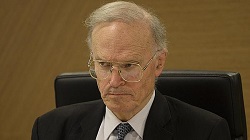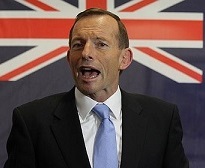David Marr has turned his considerable forensic and rhetorical skills on Abbott in an article Tony Abbott running from the law in The Saturday Paper, the weekly version of The Monthly.
(You might be able to get free access to three articles a week by signing up. I took out a three-month sub to see how it goes.)
Rather than running from the law in then usual sense, Marr’s basic point is that Abbott has no feel for the law. In pursuit of political ends he actually shows contempt for it:
Abbott doesn’t set out to break the law. That’s not the point. But when the law stands between him and a quick win, he shows contempt for its values, its customs and the part they play in national life. (Emphasis added)
Abbott is pragmatic rather than principled – he does what it takes to win the contest at hand. What we expect from Abbott is:
minimum scrutiny by the courts, maximum power to government and close to nil concern for individual rights as Canberra pursues refugees in boats and lone wolf terrorists.
An example is the amendment last year of the Maritime Powers and Migration acts.
The amendment shreds our obligations under the Refugee Conventions and hands godlike powers to immigration ministers to decide the fate of refugees.
Malcolm Fraser called the bill: “The perverse creation of a government prepared to tear up the rule of law for its own political ends.”
Abbott’s attitude to the law can be seen in his response to a US court finding that there was no legal basis for holding David Hicks in Guantanamo Bay for five years:
“Whatever the legalities … he was up to no good.”
On several occasions now Abbott has ignored due process in declaring lone wolf terrorists guilty, using the most florid language. Within hours last September Abbott declared Omarjan Azari guilty of plotting random “demonstration killings” at the direction of a senior Islamic State figure linked to Australia.
Azari’s solicitor Steven Boland has attacked Abbott for “unprecedented intrusion by a sitting PM into criminal proceedings” and complained of “irreparable prejudice” caused to his client’s case. Abbott, he says, “has deliberately or otherwise spread misinformation that has no support in the evidence”.
The resu;t could well be Azari’s acquittal.
About a month ago Omar Al-Kutobi and Mohammad Kiad were arrested for planning a terrorist attack in Sydney with a knife and a machete. Immediately they were tried and found guilty by Abbott in parliament:
“I do not think it would be possible to witness uglier fanaticism than this, more monstrous fanaticism and extremism than this, and I regret to say it is now present in our country,” he told the house.
Marr says that respect for the law is a conservative value. Abbott is no conservative. PMs normally bridle at the restraints of the law.
Abbott has been willing to a remarkable degree to push the law aside to appease populist fears and populist contempt for human rights.
In responding to Gillian Triggs Abbott failed to recognise that the Human Rights Commission is one of the pillars of our justice system. Abbott descended into street-brawling mode in an attempt to win the point. In Abbott’s world inquiries are for stitching up an opponent. He thought he was being stitched. Forget the fact that children in detention are being damaged by public policy.
He forgets too, says Marr, that judges are trusted more than politicians. Abbott is playing to his base but with respect to the centre it looks like a losing strategy.




